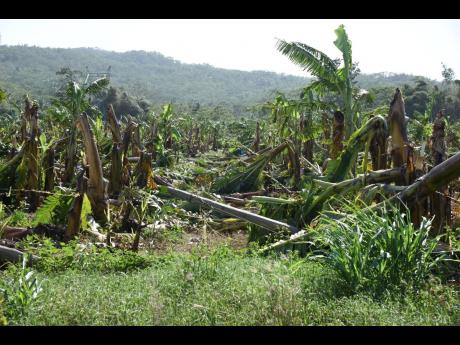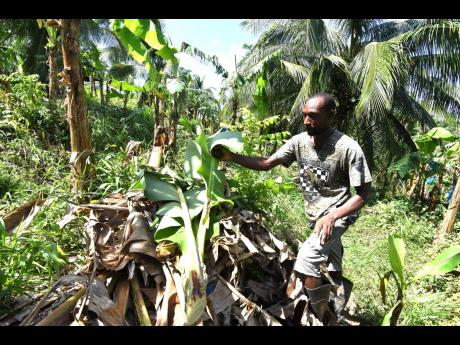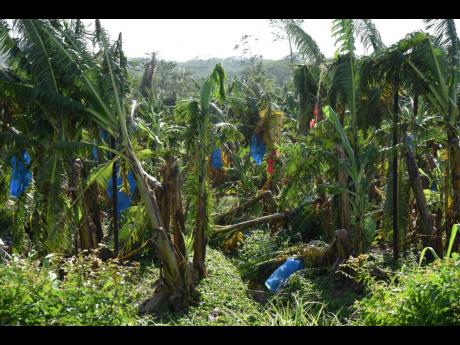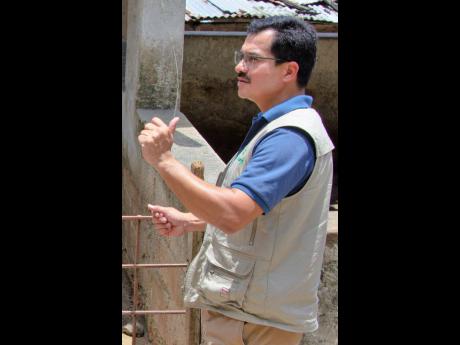Slippery forecast
Farmers say banana, plantain crops won’t recover from Beryl hit until March 2025
Farmers in St Mary, one of Jamaica’s largest plantain and banana-producing belts, are forecasting price increases as early as next month, estimating that it will require a minimum of eight months to recover from the near-complete devastation caused by Hurricane Beryl.
Preliminary assessments by the Banana Board after the passage of the Category 4 hurricane last week revealed an 80 to 100 per cent loss of bananas and plantains on farms across the island, with commercial operators seeing 90 per cent in losses.
With the agriculture sector sustaining losses of more than $1 billion, crops like banana and plantain also suffered massive blows in St Thomas, Manchester, Clarendon, St Catherine, Portland, and St James, which, together with St Mary, produce the highest yields.
On Wednesday, Beryl’s crushing blow was evident on several banana and plantain farms in St Mary. The majority of the older plants were downed by the hurricane’s fierce winds, and several trees with bunches not yet fit for harvesting were also destroyed.
Jeffery Barrieffe, who operates R&M Produce, a 14-acre banana and plantain farm in Brooklyn Road, said his loss stood at near 100 per cent.
“Almost everything down. It is a great loss. We a look at almost $2 million-odd in losses.” he told The Gleaner.
“If you nuh have good courage now, you nuh continue,” he added. “When you stand up and look at the damage, yuh heart and yuh mind have to strong when you see all of your produce going to waste.”
The veteran farmer, who was cleaning up his farm with a few workers when The Gleaner visited, said the biggest hit was to the produce that was not yet fit for harvesting.
“But, you know, the few weh drop dung, that won’t last, because, between this week and next week, everything a go finish,” he said.
Barrieffe said the country should expect a shortage of the fruit soon, noting that his colleagues in the industry have suffered a similar fate.
According to him, it is going to take a lot of work to get the crops ready for early next year.
“But the main thing now is to clean up the farm, fertilise the soil, and replenish the young suckers that are left back in the ground.”
GLOOMY OUTLOOK
In Albion Mountain, Andrew Plunkett, who has a nine-acre banana and plantain farm, shared a similarly gloomy outlook.
“Right now, dem tell me fi go look a banana and a plantain and I can’t find none,” he said.
Like Barrieffe, Plunkett supplies mainly supermarkets and local vendors. He estimated that his loss is at around 75 per cent.
Before Beryl hit, he said, “We were reaping, but, yuh know, we can’t reap everything at once. So some of them fell off and got damaged during the hurricane.”
Plunkett, who was taking a break from cleaning up his farm, also projected that it could take at least eight months to get his farm back on track and start reaping again.
“It will cost a lot to get it back up. I can’t put a figure on it right now,” he said, noting that the most pressing expenses right now are the labour cost and fertiliser.
However, while the damage is significant, he is thankful that it was not as bad as 2004’s Hurricane Ivan.
“Fi banana, you can’t do no form of preparation. It can’t tek much breeze, so we just have to pray and hope for the best,” he reasoned.
Close by, Ray Williams, who was working on a seven-acre farm with mainly bananas, also reported that the majority of his trees were damaged and none of the bananas were saved, as they were not ready for harvesting.
Like the others, he expressed frustration over the extensive work ahead to clear damaged trees, prepare the land, replant, and re-fertilise the soil to pave the way for new crops.
The farmers are hoping the government will provide assistance to speed up their recovery, as their farms were not insured.
But Barrieffe is close to breaking point, telling The Gleaner that, if his farm sustains another heavy blow, he is leaving the industry.
“If another one (hurricane) come and set us back, I won’t be continuing. So I hope and pray no more no come fi now,” he said.
On the other hand, JP Farms said that suffering a near 95 per cent loss and $160 million in damage at its 500-acre farm in Agualta Vale, the company is committed to agriculture and has no plan to leave.
“Despite you have a lot of companies going out of agriculture for the risk and how hard it is to compete, JP is doing the opposite. The board is pressing us to put this on track fast,” said General Manager Mario Figueroa.
He noted that the company, which supplies supermarkets, hotels, and the diaspora with ripe and green bananas and plantains, sees the loss as an opportunity and is already working to rehabilitate the farm, which was insured.
“The focus is to try to make the consumers understand that we are moving fast because our main goal is to put [the farm] in production as soon as possible,” he said.
Predicting, too, that a shortage will hit the market next month, Figueroa said he expects the industry to recover by early next year. He said JP Farms’ recovery could be earlier, as the farm is already in a “pretty good state”.
According to him, the company was on track to have a record year in terms of production.
“We were having a good year, we made some investment in the last year and we saw that improvement in our production,” Figueroa added.
In the meantime, Agriculture Minister Floyd Green has acknowledged the need for immediate support. He noted that an islandwide assessment will determine the damage and outline a response plan.
“What we want is for our farmers to get back to active production as soon as possible. However, their first point of contact is RADA (Rural Agricultural Development Authority),” Green recently told The Gleaner.




